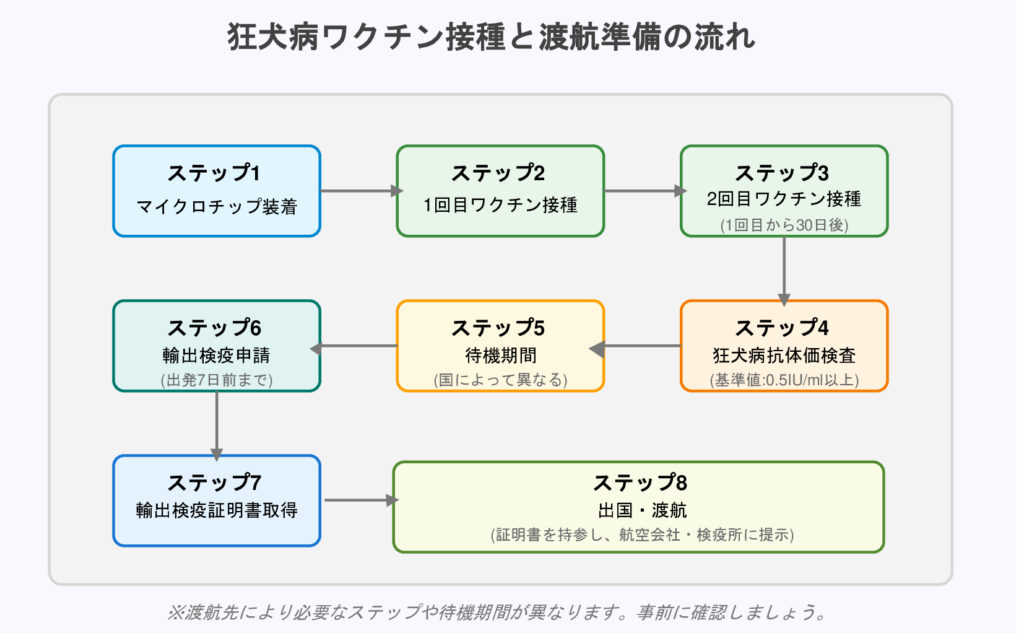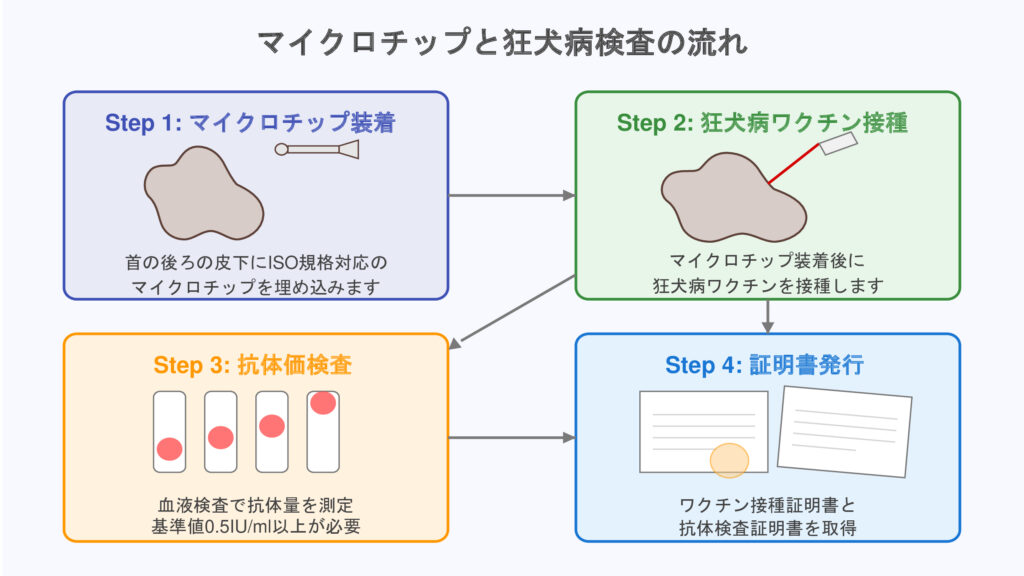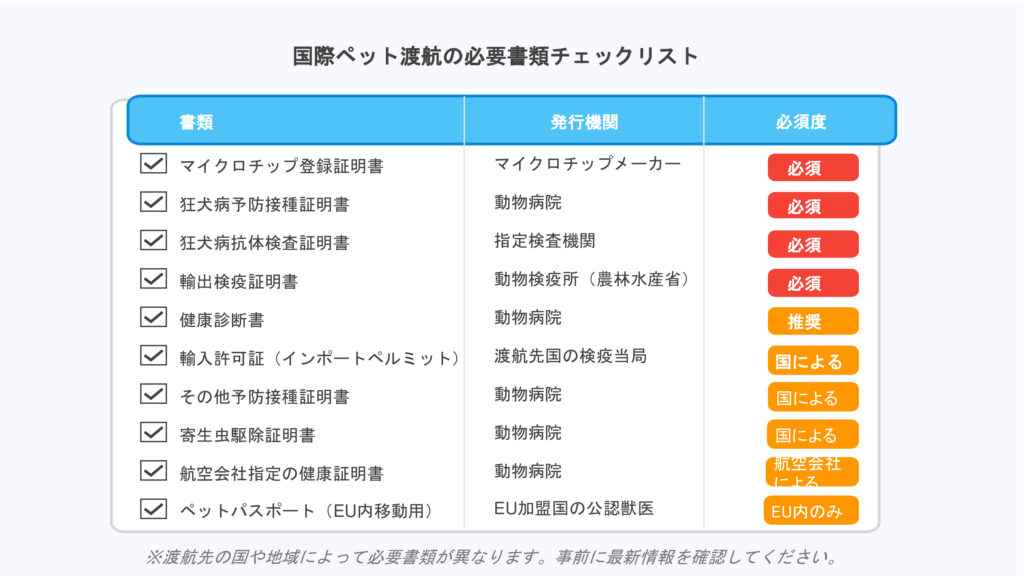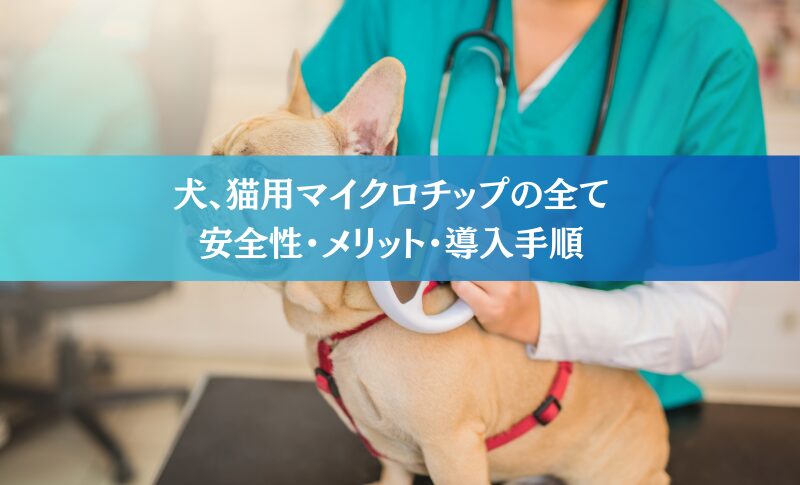If you are taking your dog abroad, it is especially important torabies vaccinationThe following is a list of procedures for the following Rabies is an extremely dangerous disease with a fatality rate of almost 1001 TP3T for both humans and dogs once contracted, and strict regulations are in place around the world for quarantine purposes.
In this article,Dogs, rabies, overseas travelThis guide provides easy-to-understand explanations for beginners, from basic knowledge to specific preparation procedures regarding We provide reliable and up-to-date knowledge, citing information from public organizations (Ministry of Agriculture, Forestry and Fisheries, WHO, etc.). Let's eliminate your worries and proceed smoothly with the procedures in preparation for your first overseas trip with your precious dog.
Basic Information on Rabies Vaccine (What is rabies? Purpose of Vaccination)
Rabiesis a viral infection caused by the rabies virus and is a zoonosis that affects the cranial nerves. The virus enters the body through the saliva of infected animals (dogs, wild animals, etc.) and causes the disease.
There is an incubation period before the onset of symptoms, but once symptoms developAlmost 1001 TP3T deaths in both dogs and humans.It is an extremely lethal disease. Japan has been clean of rabies since the 1950s.
howeverTens of thousands of human deaths from rabies each year worldwidehas been reported and is still a serious public health problem, especially in some parts of Asia and Africa.
What is the purpose of rabies vaccination?Protecting your dog from rabies.of course,Preventing the entry and spread of the rabies virusThe following is located in Japan. In Japan, based on the "Rabies Prevention Law," dogs 91 days of age or older are required to receive an annual rabies shot.
This is a necessary measure to maintain Japan's status as a rabies-free country and is the duty of the owner.The rabies vaccine is also important when traveling abroad because countries want to prevent the virus from entering their own countries.and are required to be properly vaccinated and certified prior to travel.
Types of Rabies Vaccine and Vaccination Schedule

Rabies vaccines differ in formulation and duration of efficacy.Only inactivated vaccines (dead vaccines) are used in JapanThe effective immunization period is one year after the vaccination. Therefore, it is legally required to be inoculated once a year.
On the other hand,America and EuropeIn some countries, a rabies vaccine (approved formulation by the manufacturer) that is valid for three years is available, and in some areas, a vaccination once every three years is legally required. This difference depends on the type of vaccine (live or inactivated vaccine, etc.) and the veterinary situation in each country.
In any event, "Proof of vaccination within the validity periodThe same is true of the "rabies vaccine" that is required, and if it has expired, it will be treated as invalid. Before traveling to Japan, please make sure that your dog's rabies vaccine is still within the expiration date, and get additional vaccinations if necessary.
It should be noted that Japanese vaccine certificates are generally valid for one year, while some overseas certificates are valid for three years.
nextVaccination timing and frequencyAbout. Puppies can be vaccinated against rabies only after 91 days (about 3 months) of age.initial vaccinationDepending on the destination, after theSecond inoculation after a certain period of time (booster)may be required.
For example, the Japanese Animal Quarantine Service if the dog is taken to an area that is not a rabies clean country and then re-entered,Two rabies shots after microchipping(The first is performed after 91 days of age, and the second is performed at least 30 days after the first).
in this wayMicrochip attached → 1st inoculation → 2nd inoculation at least 30 days laterschedule is also recommended for antibody testing (see below). BasicallyMicrochip is installed prior to rabies vaccinationThe following is a list of the most important factors that must be taken into account when selecting the best way to use the system.
This is because the microchip number appears on vaccine certificates and inspection documents and is used to link individual identification and vaccination history (*In some countries, vaccination without a microchip will later invalidate the certificate).
In fact, the U.S. CDC has also stated that "Microchip and then get a rabies vaccine.as one of the conditions for entry.

Be sure to have your pet microchipped prior to getting the rabies vaccine. If you don't, the certificate may become invalid!
The number and frequency of rabies vaccinations recommended in each country varies, though,Once a year or three times a yearIn Japan, the annual vaccination is required by law. In Japan, where annual inoculation is required by law, the local government sends a postcard from April to June, and the inoculation is administered at a veterinary clinic or group inoculation.
On the other hand, even in countries where the 3-year validity type is available,Must be within 1 year of the most recent vaccination at the time of travelNote that you may be asked to do so (it is not "OK to leave it for 3 years because it is a 3-year vaccine").
Additional inoculation just prior to travelThe decision regarding the following will be made in accordance with the regulations of each country. If it is already within the expiration date, no addition is required, but it is safe to get the next vaccination before the expiration date. In any caseProof of rabies vaccination valid at the time of travelis important to have on hand.
Vaccination requirements for international travel (national regulations, WHO and IATA standards)
When taking a dog abroad, many countries require a certificate of rabies vaccination as a condition for entry.The rules vary from destination to destination. Detailed rules vary from destination to destination, but in generalIndividual identification by microchipandProof of rabies vaccinationis required.
For example, even the International Air Transport Association (IATA) guidelines,Veterinarian-issued health certificate (including rabies vaccination information and antibody test results)Most airlines and destination countries will require the presentation of a Health examination at a veterinary clinic prior to travel,Rabies vaccine must be up-to-dateand have a certificate issued.
As an example of regulations in different countries,United States of AmericaNow, if you are entering a dog from a high-risk country,Must be microchipped and vaccinated against rabiesis a requirement, and for the first vaccineMore than 28 days after vaccinationIf you have not done so, you will not be allowed to enter the country.
EU countriesBut rabies vaccination at 12 weeks of age or older is required, and there is a provision requiring a 21-day waiting period after the first vaccination (the EU has designated Japan as a clean country, so antibody testing is exempt, but vaccine certification is required).
in this wayNo one is allowed into the country until a certain number of days have elapsed since the vaccination."Therefore, it is important to allow plenty of time for your schedule when planning your trip.
In some countries, vaccinations other than rabies, proof of parasite treatment, and evenImport Permit (Import Permit)is required in some cases. Be sure to include theOfficial information from embassies and quarantine authorities prior to travelto find out the latest entry requirements.
Although WHO (World Health Organization) and OIE (World Organization for Animal Health) standards provide classification of rabies clean and non-clean countries and antibody titer criteria (*see below),Ultimately, country-specific regulations must be followedThe following is a brief overview of the vaccinations and documentation required for your dog to enter the United States. To ensure trouble-free entry for your dog, be sure to have the necessary vaccinations and documentation ready.
How to obtain an inoculation certificate (required certificates and issuing agency)

rabies vaccination certificateis a document that certifies the fact that you have been vaccinated against rabies. It is usually issued by the veterinary hospital where the vaccination was given.
In Japan, a "rabies vaccination certificate" is issued at a veterinary clinic, and the procedure is carried out at the municipal office.licenceandcompleted injectable form (e.g. required testis)will be issued (dog tags and injection certificates must be attached to the dog's collar, etc.).
I would like to note here,The dog tag itself is not a substitute for a rabies vaccination certificate.This is the point. The identification tag and certificate are only a sign of compliance with domestic laws,The vaccination certificate itself is required for international travelIt is.
There are two main types of documents required when traveling abroad: one isRabies vaccination certificate issued by a veterinarian(Rabies Vaccination Certificate) and the other isOfficial export quarantine certificate issued by a government agency(It is called a Health Certificate, etc.).
The former is a document obtained at veterinary clinics, and the latter is a document issued by the quarantine authorities of each country's government. When leaving Japan, the Ministry of Agriculture, Forestry and Fisheries of Japanquarantine station for animalsThe exported goods will undergo an export inspection and obtain an Export Quarantine Certificate at
At this time,Submit the rabies shot certificate obtained from the veterinary hospital in advance.and its contents will be included in the official certificate. In other wordsThe quarantine station issues an official English certificate under the veterinary hospital's certificate.Image.

The quarantine certificate is issued by the Animal Quarantine Service in Japan. This will serve as an international passport for your dog!
The export quarantine certificate will include the date of rabies vaccination, type of vaccine, expiration date, microchip number, owner information, and animal information. The issuing agency is in Japan.Animal quarantine station (under the jurisdiction of the Ministry of Agriculture, Forestry and Fisheries)However, depending on the destination, additional documents may be required in the other country.
For example.Import PermitIn some countries, a certificate from the Japanese animal quarantine office may be required to obtain the certificate in advance. The name and format of the document varies from country to country,Certificate of rabies vaccination issued and approved by a public institution.are required in common.
As a point of reference,All certificates must include the microchip numberIf you have a microchip number, you will need to have the microchip number included in all documents required for travel. All documents required for travel, such as rabies vaccine certificate and rabies antibody test result certificate (see below), must include a microchip number as an individual identification number or they may become invalid.
It is also important to manage certificate expiration dates.Rabies shot certificate for 1 year from the date of vaccinationWe considered it to be effective,Rabies antibody test certificate for 2 years from the date of blood collectionIt is considered valid. Plan to avoid missing these deadlines.
The certification documents are generally written in English, but those issued by the Japanese animal quarantine office are bilingual (English and Japanese). Some destinations may specify the format, so please use the form as necessary.Check with the other country's embassy or quarantine agencyPlease ask them to issue the appropriate form.
Rabies antibody titer test (purpose, method, timing, and reference values for antibody testing)
Rabies antibody titer test(The Rabies Antibody Titer Test (RABT) is a blood test to confirm that the body has sufficient immune antibodies from the rabies vaccination. This is especially important forWhen dogs are allowed to enter a rabies-free country (no outbreak of rabies)required for the
For example, Japan, Hawaii, Australia, New Zealand, and EU countries (upon entry from non-clean countries) require the submission of these test results. The purpose of the antibody test is to prove that even if a vaccinated dog potentially carries the virus, if it has sufficient antibodies, the risk of developing the virus is low and the possibility of transmitting the virus to others is extremely low.
In the antibody test method, blood is collected at a veterinary clinic after vaccination, and the serum is sent to a specialized laboratory to measure antibody titers. The results are reported as a numerical value (IU/ml),The reference value is 0.5 IU/ml or higher internationallyIt is stipulated that
This value of 0.5 IU/ml is considered by the World Health Organization (WHO) guidelines to be an "adequate immune response to rabies vaccine," and is adopted by many countries as the line for passing the antibody test.
In other words, if the test results areIf less than 0.5 IU/mlare not considered to be sufficiently immunized and must be vaccinated again to raise antibody titers. Fortunately, many dogs will pass the criteria if they have been vaccinated at least twice at appropriate intervals, but in the unlikely event that they failAdditional vaccinations and retestsTherefore, it is important to allow plenty of time for scheduling.
In case of failure: Re-vaccinate and redo the antibody test.
Validity of the certificate: 2 years from the date of blood collection
The timing for antibody testing is usuallyA few weeks after the second rabies vaccinationis recommended (to wait for antibodies to rise sufficiently).
According to the guidelines of the Japanese Animal Quarantine Service, blood can be drawn immediately after the second vaccination, but in practice, many veterinarians draw blood about two weeks to one month after the vaccination. After blood is collected, serum neutralizing antibody titers are measured at a designated laboratory.
From Japan, inspection facilities designated by the Minister of Agriculture, Forestry and Fisheries(The results of the test must be obtained from a private laboratory (such as the National Livestock Hygiene Laboratory or a private laboratory in Japan, or Kansas State University overseas). It usually takes one to two weeks to get the results, a little longer during peak season.
The validity period of the antibody test should also be noted.Valid in Japan for 2 years from the date of blood collectionThe test is required to be taken within two years of the date of blood collection. For example, if you plan to return to your home country within 2 years of the blood collection, you do not need to be retested, but if your stay in Japan will be longer than 2 years, you will need to take another antibody test in your home country.
Once the EU has passed the test, there is no need to retest as long as the rabies vaccine continues to be administered without expiration (if the vaccine expires, the test must be redone again). (If you run out of vaccine, you have to start all over again.) Thus, once the antibody test is passed, it is valid for a while,To be taken well in advance of departure.is desirable.
Especially if there is even a small chance that after leaving Japan, you will stay in an area that is not a clean country and later re-enter Japan,We strongly recommend that you complete the antibody test in Japan before leaving Japan.The government will not accept a rabies antibody test. Although it is possible to take a rabies antibody test locally, in order to re-enter Japan, the test must be conducted by a "designated Japanese institution" and more work is required, such as obtaining a government endorsement on the certificate of results.
If you have completed the antibody test in Japan before leaving Japan, you can rest assured that the results will be confirmed and a certificate issued at the animal quarantine station.
Waiting period prior to travel (required countries and their rules)
In rabies-free countries, even if they have been vaccinated and tested for antibodies,Certain waiting period before entering the country(waiting period) may be imposed. This is a safety measure to ensure that even if an animal is latently infected at the time of antibody testing, it will not develop the disease during the incubation period.
Typical.180-day (6-month) waiting periodand has been adopted in Japan, Australia, Hawaii, and other countries.
When allowing dogs into JapanFor dogs and cats coming from rabies-affected countries (outside of designated areas), "the date of blood collection (date of antibody test) is considered to be day 0".Waiting for more than 180 daysIt is required to "do the same thing.
For example, if a blood sample for an antibody titer test is collected in Japan on January 1, it must arrive in Japan on or after July 1. If the blood sample is collected before 180 days have elapsed, the missing days must be paid for at the animal quarantine station in Japan.Mooring quarantine (isolation)The following is a list of the most important factors that must be taken into account when making a decision on the purchase of a new building.

I did not know that a six-month waiting period is required. If you plan to return to Japan, it is important to have the test done before leaving the country.
This waiting period must be strictly adhered to, as in the worst case scenario, the dog will be separated from you for 180 days (about six months).
Australia and New ZealandThese countries also have a system whereby the number of days of waiting outside the country prior to travel can be shortened, and the remainder can be made up by quarantine for about 10 days in the country (although not as long an advance waiting period as in Japan, the applicant is required to stay in a quarantine facility at the time of entry).
EU countriesIf the traveler is from a clean country, no waiting period is required, but if the traveler is from a non-clean country, no waiting period is required.3 months after antibody blood collectionThe EU Rabies Regulations require a waiting period of 3 months before a puppy is allowed to enter the country. This is stipulated in the EU rabies regulations, and if you are bringing a puppy from a non-purified country, the process is: vaccine, blood collection after 30 days, and entry into the country after another 3 months from the blood collection (that is, about 4 months in total).
Above,Whether the destination country is rabies-free or notThe existence and length of the waiting period is determined by For those who reside in Japan and take their dog abroad,Destination is a clean country (Hawaii, Guam, Iceland, Australia NZ, etc.)If this is the case, then including this waiting periodAt least 7-8 months for preparationshould be looked at.
For travel to other countries (e.g., the U.S. mainland, Southeast Asian countries, and other non-clean countries), there is no waiting period on the Japanese side at the time of departure. However180-day waiting period requirement upon returnwill emerge, so please keep in mind not to make the "going good, returning hard".
Make travel plans as early as possible and consult with experts as needed.It is safe to proceed as you go along. Remember to check for the latest information, as country-specific regulations are subject to change.
Preparation of documents required for travel and application procedures
Preparation for travel with your dog involves a wide range of tasks, but if you organize them in a step-by-step manner, you will be able to proceed without fail. The following is a summary of the general preparation procedure, using the case of leaving Japan as an example.
1. Microchip installed: (1) The first step is to install an ISO-compliant microchip in your dog (if you have already done so, go on to the next step). This is the basis of individual identification,Must be performed prior to rabies vaccinationLet's do it.
2. Rabies vaccination (1st):. If the dog is over 91 days old, the first rabies vaccination will be given. Receive the vaccination certificate and keep it in a safe place. Complete the registration procedures in Japan (obtaining a dog tag and certificate).
3. Rabies vaccination (2nd):. Two inoculations may be required depending on the destination and the plan to return home.Second time after more than 30 days.inoculation. You will receive and keep a certificate for this as well.
4. Rabies antibody titer test:. After the second vaccination, blood will be drawn for antibody testing if necessary. A test result of 0.5 IU/ml or higher is considered acceptable, and a certificate (notification of results) will be issued.Wait 180 days from the date of blood collectionIf you are going to a country that requires a
5. Check additional requirements for destinations:. Depending on the country of destination, proof of vaccination other than rabies (e.g., leptospirosis for dogs), proof of deworming, import permit, etc. may be required. Check the official information of each country and complete the missing documents and procedures.
6. Application for export quarantine (Japanese side):. When your departure draws near, you must go to the animal quarantine office in Japan.Application for export inspectionwill be performed. At the latest.Up to 7 days before departureYou can also submit an online application through ANIPAS (Animal Quarantine and Animal Health Electronic System). At the time of application, please submit the application form with the following documents that you have prepared so far.rabies vaccination certificateand ... andCertificate of Antibody TestYou will be asked to submit a copy of the
7. Export inspections:. At the animal quarantine station at the airport on the day of departure or the day beforeexport inspectionThe dog will be checked for a microchip and the original documents will be checked. Your dog will actually be left with a staff member, who will check the reading of the microchip and the original documents. If there are no problemsExport quarantine certificate (English)will be issued. If this certificate isActs like a passport for dogsThe document will serve as the official document to be submitted to the destination country.
8. Presentation of documents to the airline and boarding:. When boarding an airplane, your pet's documents will be checked at the check-in counter. Even if you declared that you are bringing your pet with you when you made your reservation,Present proof at the airport on the same dayOtherwise, you may be refused transportation. Be prepared to produce a complete set of documents such as a rabies certificate, quarantine certificate, and in some cases, an import permit. Some airlines may ask you to submit copies of these documents in advance.
9. Immigration procedures at destination:. Upon arrival at the destination airport, you will complete entry procedures for your pet at customs and quarantine. Submit the documents instructed by the staff (export certificate and vaccine certificate issued in Japan), and if there are no problems, your pet will be allowed to enter the country. Depending on the country, a microchip verification and a simple health check may be conducted.
The above is the general flow of the process. It may seem complicated if it is your first time, but it is all right if you deal with each one in turn. If you are unsureConsult with the animal quarantine station in advance.or seek advice from a pet transport agent or a professional veterinarian.
especiallyIf you are returning to Japan again after a short tripshould be noted. If the time to return home is less than two years,Must be microchipped, vaccinated twice, and tested for antibodies in Japan before leaving the country.is recommended. By doing so, you can be reunited with your dog smoothly, as the quarantine at the time of return to Japan can be completed within a minimum of 12 hours (document examination only).
On the other hand, if you are not prepared, your pet may be detained for up to 180 days upon your return. This is because you do not want your precious family pet to be away from you for an extended period of time,Be well-prepared and set out on an enjoyable journey.

✓ Rabies vaccination (1st)
✓ Rabies vaccination (2nd dose, at least 30 days later)
✓ Antibody titer test (in countries where required)
✓ Confirm waiting period (e.g., 180 days)
✓ Obtain additional required documents
✓ Export quarantine application (up to 7 days in advance)
✓ Export inspection at quarantine station and acquisition of certificate
✓ Presentation of documents to airline company
✓ Local immigration procedures

Corresponding to the 2024 legal revision! A veterinarian provides a thorough explanation of the mandatory microchipping of dogs and cats, including safety, benefits, and specific procedures for introduction. We also explain in detail the precautions to be taken when traveling overseas.
Frequently Asked Questions (FAQ)
Q1: If I travel from Japan to a rabies-free country, do I still need a rabies vaccine?
Q2: Can I take a puppy under 3 months old overseas?
A2. Depends on the country, but basically difficult.Consider this. Many countries prohibit the entry of puppies that have not been vaccinated against rabies; the EU has an exceptional system that allows puppies under 12 weeks of age on a conditional basis, but it requires an import permit, which is a hurdle.
Entry into Japan is also virtually impossible if the child is less than 91 days old and unvaccinated.More than 180 days mooring quarantineThis is not realistic. For safety reasons, we recommend that you make travel plans only after your dog is fully grown and vaccinated.
Q3: How far in advance should I start preparing for my trip?
A3. It depends on the destination. If you are going to a rabies-free countryAt least 7-8 months prior to departureStart preparations from the beginning (for microchip installation, 2 vaccinations, antibody testing + 180-day waiting period).
Even in other countries, a 30-day waiting period is required after the first vaccination, and the paperwork takes time.Six months in advance with plenty of time to spare.It is safe to start planning. Be sure to act as early as possible to avoid last-minute rush.
Q4. Once I pass the rabies antibody test, do I need a waiting period for each trip?
A4. Re-testing and long waits are generally unnecessary if the patient continues to receive vaccinesIn Japan, if you return to your country within 2 years of the blood collection, a new antibody test is not required. In Japan, if you return to your country within 2 years of the blood collection, you are exempted from a new antibody test, and the EU does not require a new antibody test unless the vaccine expires.
However,Continuing to receive vaccine boosters on time.is a requirement, so please do not forget to get additional vaccinations during your trip. If your return to your home country is likely to be longer than two years, you will need to take another antibody test in your home country. Before returning to your home country, you will be required to take the test, obtain a certificate, and have it endorsed by the local Japanese embassy or other appropriate organization.
If you plan to stay for a long period of time, plan accordingly.
Q5: Is there anyone I can consult with regarding travel preparation and procedures?
A5. Yes, there is.Ministry of Agriculture, Forestry and Fisheries.quarantine station for animalswill provide individual consultation by phone or e-mail, or you can contact the relevant department at the embassy of your country.
Also on this site,Individual consultation service via official LINEWe have established a Please feel free to meet with our professional staff online for a free consultation. Please let us know your planned departure date, destination, and your dog's situation, and we will provide you with a checklist of necessary procedures.
Official Line Registration and Free Online Interviews
PetAir JPN is committed to supporting pet owners who are traveling abroad with their pets for the first time.Official LINE accountThe company operates a
If you have read the article, please feel free to register on line and send us a message. We will of course provide you with advice and the latest information tailored to your individual circumstances,Free online interview with our professional staffis also being accepted.
During the online interview, you can review the preparation process with us, lecture on how to fill out the paperwork, and ask questions directly. Can my child travel?" What do I need to do to go to this country? We will carefully answer such questions as "Can my child travel?

When I first went abroad with my dog, it was really helpful to be able to consult with an expert. It is a great service to be able to consult for free!
▶ How to register on the official LINE:. You can add a friend by clicking on the "Contact us on LINE" button at the bottom of this page. Our staff will check the contents of your message and reply to you as soon as possible.
▶ How to apply for a free online interview:. Please send us a message on LINE saying that you would like to have a meeting. We will send you a calendar URL for scheduling a meeting, and you can choose a date and time that is convenient for you. Of course, there is no charge for this service.
We will do our best to help you realize an enjoyable overseas life and travel with your precious dog. As a benefit of registering on our official LINE, we also provide a free travel preparation checklist and sample collection of required documents.
Enjoy traveling with your dog safely and comfortably with full preparation! We look forward to hearing from you. 🏖️✈️🐕💖
\ First of all, free consultation on line! / /

Consultation is completely free of charge.
Free online consultation is also available.
Weekends and holidays are also available.
References
– Animal Quarantine Service of the Ministry of Agriculture, Forestry and Fisheries - About taking dogs and cats out of Japan to overseas
– Ministry of Health, Labour and Welfare - Information on Rabies Prevention Law
- WHO (World Health Organization) - Guidelines for Zoonoses
– CDC (Centers for Disease Control and Prevention) - Import Rules for Pets
- International Air Transport Association (IATA) - Pet Transport Guidelines
![Support for pets traveling and moving overseas|PetAir JPN [Official] for international transportation and quarantine procedures for dogs and cats Support for pets traveling and moving overseas|PetAir JPN [Official] for international transportation and quarantine procedures for dogs and cats](https://petair.jp/wp-content/uploads/2024/08/main_logo.png?1772221513)



Comment